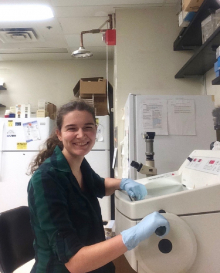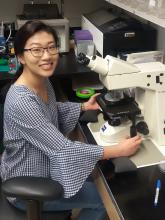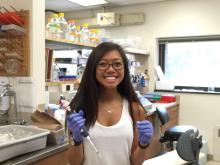Congratulations to Sedona Ewbank, Julia Joo, and Briana Lee for winning Washington Research Scholarships!

Sedona is currently a senior majoring in Neurobiology and Biochemistry at the University of Washington. Most recently, Sedona’s interest in the relationship between the central nervous system and the gut microbiota has led her to join the Palmiter Laboratory in the Department of Biochemistry. In the Palmiter Laboratory, she is investigating whether a group of neurons in the hypothalamus which are known to drive feeding behavior, AgRP neurons, may also have a role in shaping the composition of the gut microbiota to promote energy homeostasis. This research project could provide insight into how humans regulate the microbiome in health and in disease. Following the completion of her bachelor’s degree, Sedona plans to attend graduate school in order to earn a Ph.D. and pursue a career in academic research.

Julia is a senior studying Biochemistry and Molecular, Cellular, and Developmental Biology. She is exploring the mutator phenotype of cancer, which theorizes that mutation rates are elevated in cancer cells and thus lead to the accumulation of mutations that accelerate tumorigenesis. She is interested in identifying mutations in genes that can modulate mutation rates, as understanding their functions may contribute to novel approaches for cancer treatments by targeting the mutator phenotype. She is specifically investigating the methods by which Chromosome Transmission Factor (Ctf18) suppresses mutation rates in yeast deficient in DNA polymerase epsilon proofreading, potentially via novel mechanisms involving direct interaction with the polymerase.

Briana Lee is a senior undergraduate student majoring in both neurobiology and biochemistry. Briana is interested in how physics and chemistry can be applied to explain biological phenomenon. She has a passion for interdisciplinary studies and her current research involves processing neuroimaging data to analyze functional connectivity networks in Alzheimer’s Disease (AD). Functional networks are clusters of neurons within the brain that activate together when completing a certain task. These networks are not well characterized or understood and Briana is interested in quantifying how a specific functional network called the default mode network (DMN) changes during AD progression. She is also interested in how the DMN behaves differently across individuals, potentially providing insight to how environmental or demographic characteristics can affect an individual’s network capabilities. After graduating from UW, she hopes to attend medical school, while continuing research in a neurobiology-related field.